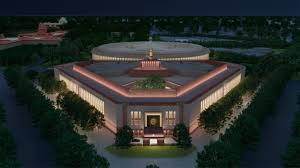Proposal for Shifting Parliament Sessions Outside Delhi (GS Paper 2, Polity)

Why the Proposal Gained Attention
- Recently, a Member of Parliament (MP) from YSR Congress proposed the idea of holding two Parliament sessions each year outside Delhi, particularly in southern cities, to alleviate the logistical and climatic difficulties faced by MPs during the extreme weather conditions in Delhi.
- This idea has historical roots, with prominent leaders like Dr. B.R. Ambedkar and Atal Bihari Vajpayee having supported similar proposals in the past.
- The debate has gained renewed attention and calls for a re-evaluation of India's centralized parliamentary structure.
Historical Background: The Push for a Decentralized Parliament
- Dr. B.R. Ambedkar, in his book Thoughts on Linguistic States, proposed the decentralization of India's political functions by suggesting that sessions of Parliament be held outside Delhi.
- He argued that the city’s extreme climate, especially during winter, posed significant challenges for representatives from the southern states.
- Additionally, Ambedkar raised concerns over Delhi’s vulnerability to external threats, suggesting that a second capital in a more geographically central location could enhance national security.
- In 1959, Independent MP Prakash Vir Shastri introduced a Private Member’s Resolution advocating for a Parliament session in South India, with Hyderabad or Bangalore as potential venues.
- Atal Bihari Vajpayee, a first-time MP at the time, expressed support for the idea, emphasizing its potential to strengthen national unity rather than promoting regional politics.
Constitutional Framework for Parliament Sessions
- The Indian Constitution does not specify a particular location for Parliament sessions. Under Article 85, the President of India has the authority to summon Parliament at a place and time of their choosing.
- However, for over 75 years, Parliament has traditionally convened in Delhi, the nation’s capital, without any formal legal requirement that it remain in the city.
Reasons for Holding Sessions Outside Delhi
- Promoting Regional Inclusivity: Holding Parliament sessions outside Delhi could offer greater visibility and representation for southern states, contributing to more inclusive national policymaking. It would highlight the commitment to regional balance and ensure that the concerns of all areas of India are addressed.
- Climate Considerations: Delhi’s severe winters and hot summers often impede the efficiency and health of MPs. By moving sessions to a more temperate region, MPs could experience better working conditions, potentially improving legislative productivity.
- Decentralization of Power: The shift could be viewed as an effort to decentralize governance, aligning with democratic principles that suggest governance should be accessible to all citizens, no matter where they reside in the country.
- Historical Precedent: The endorsement of this idea by historical figures like Ambedkar and Vajpayee gives it additional credibility. The fact that such proposals were made by respected leaders adds weight to the current discourse on decentralization.
Challenges to Holding Parliament Outside Delhi
- Logistical Issues: Relocating Parliament's machinery, infrastructure, and staff to another region would require significant planning, resources, and time. Many critics argue that the process would be inefficient and wasteful, potentially causing unnecessary delays in legislative work.
- Political Risks: There is concern that moving sessions outside Delhi could deepen the North-South divide, reinforcing regional identities and undermining national unity. This could potentially lead to greater political polarization.
- Existing Institutional Structure: Parliament has functioned smoothly in Delhi for over seven decades, with no apparent negative impact on regional integration. Critics argue that the existing system is sufficient to represent southern states without the need for a geographical shift.
Examples from Other Countries with Multiple Capitals
- South Africa: South Africa uses three capitals—Pretoria (administrative), Cape Town (legislative), and Bloemfontein (judicial)—a system designed to decentralize power and promote regional representation.
- Malaysia: The country has Kuala Lumpur as its administrative capital and Putrajaya as the administrative and judicial hub, helping ease congestion and improving government functionality.
- Switzerland: Bern serves as the federal city while allowing significant autonomy to its regional areas, ensuring the inclusion of various linguistic and cultural groups.
- Australia: Canberra was specifically built to serve as Australia's capital, positioned between Sydney and Melbourne to maintain neutrality and avoid tensions between the two largest cities.
Path Forward: How to Implement the Idea
- Pilot Sessions in Southern Cities: The government could begin by conducting parliamentary committee meetings or short winter sessions in cities like Bengaluru or Hyderabad to test the feasibility of relocating the sessions. This would help assess the logistical challenges and public response.
- Strengthening Regional Representation: An alternative to shifting Parliament sessions could be to increase the representation of southern states in Parliament, especially with post-census reforms. This could address regional concerns without requiring a drastic change to existing systems.
- Leveraging Technology: Investing in better communication technology and streamlining logistics could allow MPs from all regions to participate more effectively, minimizing the need for frequent travel and addressing climate challenges.
Conclusion: Reevaluating India’s Governance Structures
- The proposal to move parliamentary sessions outside Delhi raises important questions about regional representation and the distribution of political power.
- While the idea has merit in terms of inclusivity and addressing logistical concerns, it also presents challenges related to practicality and national unity.
- A balanced approach—starting with pilot regional sessions, enhancing communication infrastructure, and improving regional representation—could help ensure that the voices of all regions are heard without compromising the efficiency of governance.
- This ongoing debate offers an opportunity to rethink and reimagine India’s governance structures in a more inclusive and resilient way.


